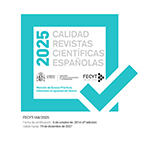El concepto de "Europa" en la Revista de Occidente (1923-1936) y su recepción en José Ortega y Gasset
Resumen
El artículo profundiza en el concepto de Europa de José Ortega y Gasset (1883-1955) investigando, mediante análisis de discursos, los factores de influencia incorporados en España, durante el período de entreguerras, las transferencias culturales de la Revista de Occidente y las traducciones de su editoral entre 1923 y 1936. Resulta que existen tres factores centrales que determinaron el concepto de »Europa« difundido por Ortega y el »círculo de la Revista de Occidente«: (a) la morfología histórica de Oswald Spengler (1880-1936), (b) la metafísica cultural de Herman von Keyserling (1880-1946), y (c) la psicología de los pueblos de Wilhlem Haas (1883-1956). Estos factores de impacto decisivo generaron diversos residuos en el concepto de »Europa« de Ortega y de la Revista de Occidente que impiden clasificarlo como moderno.
Descargas
Descarga artículo
Licencia
La revista Política y Sociedad, para fomentar el intercambio global del conocimiento, facilita el acceso sin restricciones a sus contenidos desde el momento de su publicación en la presente edición electrónica, y por eso es una revista de acceso abierto. Los originales publicados en esta revista son propiedad de la Universidad Complutense de Madrid y es obligatorio citar su procedencia en cualquier reproducción total o parcial. Todos los contenidos se distribuyen bajo una licencia de uso y distribución Creative Commons Reconocimiento 4.0 (CC BY 4.0). Esta circunstancia ha de hacerse constar expresamente de esta forma cuando sea necesario. Puede consultar la versión informativa y el texto legal de la licencia.











